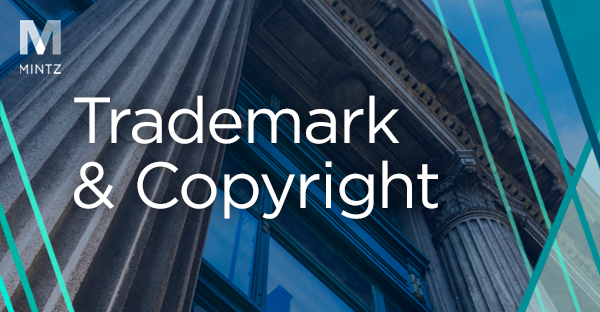
Trademark Litigation
Viewpoints
Filter by:
When Can a Trademark Owner Take Action for Unauthorized Use of its Trademark Online?
January 4, 2022 | Blog | By Susan Neuberger Weller
Unauthorized use of a trademark on the Internet occurs often and in many forms, usually involving the profiting, whether intentionally or unintentionally, from the goodwill associated with a trademark belonging to someone else. Such use, however, does not always rise to the level of trademark infringement. Unauthorized use of a trademark is only infringing if the particular use causes likely confusion among consumers. The most common type of confusion is confusion over source, which occurs at the time of purchase, but confusion can also arise as to affiliation, connection, or sponsorship, and confusion does not necessarily need to occur at the time of purchase.
Read more
The Trademark Modernization Act’s New Cancellation Procedures are Now Effective
December 28, 2021 | Blog | By Michael Graif
Is an unused registered trademark preventing you from clearing or registering your mark? Or was the blocking registration filed for goods or services that were not in use when the registrant declared that they were? The Trademark Modernization Act’s (“TMA”) new procedures for cancelling unused registrations, or registrations with goods and services that were not in use at the time of declaration, are now effective.
Read more
Supreme Court to Consider When Inaccurate Information in a Copyright Registration Affects its Validity in Unicolors v. H&M
June 9, 2021 | Blog | By Michael Graif
After five years of litigation, the battle between Unicolors, a California-based fabric design company, and H&M is still going strong. Now the United States Supreme Court has agreed to decide whether an inaccuracy in Unicolors’ copyright registration invalidates its registration and thus a jury’s $1 million damages award in Unicolors’ favor.
Read more
The Trademark Modernization Act Establishes New Trademark Cancellation Procedures
January 12, 2021 | Blog | By Michael Graif, Williams Dixon
On December 27, 2020, the Trademark Modernization Act of 2020 (“the Act”) became law as part of the Consolidated Appropriations Act, 2021.
Read more
SCOTUS Rules “Generic.com” Marks Are Eligible For Federal Trademark Protection
July 7, 2020 | Blog | By Susan Neuberger Weller
In a landmark decision, United States Patent and Trademark Office v. Booking.com B.V., the Supreme Court of the United States, by an 8-1 vote, affirmed the lower court’s determination that Booking.com could register BOOKING.COM as a trademark.
Read more
Defense in Trademark Action Not Precluded by Failure to Raise Same Defense in Earlier Action
May 15, 2020 | Blog | By Michael Graif, Meena Seralathan
The United States Supreme Court unanimously held this week that Lucky Brand was not precluded from mounting a new defense in its litigation with Marcel Fashions Group — despite having chosen not to bring up the same defense in a prior litigation. This ruling clarifies the circumstances under which a defense can be precluded from a lawsuit.
Read more
US Supreme Court Holds That Trademark Owners Need Not Prove Willful Infringement To Seek An Infringer’s Profits
April 23, 2020 | Blog | By Susan Neuberger Weller, Michael Graif
In a unanimous decision, the US Supreme Court held that a trademark owner need not prove willful infringement in order to seek lost profits from a trademark infringer. The case, Romag Fasteners Inc. v. Fossil Inc. et al., case number 18-1233, involved a long running trademark infringement dispute between the parties.
Read more
FUCT? You Heard That Right: Refusing to Register “Scandalous” and “Immoral” Trademarks is Unconstitutional
June 27, 2019 | Blog | By Susan Neuberger Weller
The U.S. Supreme Court, in a split decision, held that the federal ban on registering “scandalous” and “immoral” trademarks is an unconstitutional violation of free speech under the First Amendment of the US Constitution. The trademark FUCT is what was at issue in Iancu v. Brunetti, case number 18-302 (June 24, 2019). Although the mark had been in use on clothing for many years, it was never accepted for registration by the US Trademark Office on grounds that it violated the ban on registration of “scandalous” and “immoral” marks under Section 1052(a) of the Lanham Act.
Read more
U.S. Supreme Court Holds That Copyrights Must Be Registered before Plaintiffs Can File Infringement Suits
March 5, 2019 | Blog | By Susan Neuberger Weller, Andrew D. Skale
The U.S. Supreme Court held today that bringing a suit for copyright infringement requires that the infringed work actually be registered with the U.S. Copyright Office, and that a mere application for registration will not suffice.
Read more
Significant 2018 Trademark Decisions
January 9, 2019 | Blog | By Michael Graif
This year the Supreme Court, United States Court of Appeals for the Federal Circuit, and the Circuit Courts penned a number of opinions impacting trademark law. Here are some key takeaways from the past year:
Read more
Brewery Defeats Trademark Opposition by Conservative Public Figure Phyllis Schlafly
December 18, 2018 | Blog | By Michael Graif
Relatives of the late conservative political activist, Phyllis Schlafly, lost their appeal to prevent the Saint Louis Brewery, LLC (“the Brewery”) from trademarking the Schlafly name in connection with various beer products on November 26, 2018.
Read more
After the Supreme Court Touchdown, Washington Redskins Are Finally Winning at the Fourth Circuit and the PTO
January 29, 2018 | Blog | By Susan Neuberger Weller, Timur Slonim
Two incredible things happened in 1992 for the NFL football team Washington Redskins. It won the Super Bowl and applied to register a trademark Washington Redskins. It has not been so lucky ever since. It has not won another Super Bowl and has not registered that mark since 1992.
Read more
Company “Branding” and Benefits of Federal Trademark Registration
November 16, 2017 | Blog | By Susan Neuberger Weller
Selecting and protecting your “brand” should begin from the very moment a business is in the process of being formed, whether that business is a sole proprietorship, partnership, corporation, limited liability company, or some other type of entity.
Read more
Matal v. Tam: U.S. Supreme Court Holds Prohibition on Disparaging Trademarks Unconstitutional under First Amendment
June 20, 2017 | Blog | By Susan Neuberger Weller
In a unanimous decision handed down on June 19th, the U.S. Supreme Court struck down as unconstitutional a long-standing prohibition against federal registration of “disparaging” trademarks, finding that the this provision of the Lanham Act violates the Free Speech Clause of the First Amendment.
Read more
Pizza! Pizza!: Little Caesar’s Repeated Term Slogans Are Not a “Family of Marks”
January 12, 2017 | Blog | By Susan Neuberger Weller
Although most people will recognize the ubiquitous PIZZA! PIZZA! slogan mark owned by the pizza chain Little Caesar’s, the company’s collection of repeated term marks does not rise to the level of a “family of marks” according to the Trademark Trial and Appeal Board.
Read more
Trademark Trial and Appeal Board: Non-Spanish Speakers Would Confuse PATRON and PORTON Trademarks
January 10, 2017 | Blog | By Susan Neuberger Weller
In a non-precedential opinion, the U.S. Trademark Trial and Appeal Board cancelled two US trademark registrations for the mark PORTON, finding it to be confusingly similar to the mark PATRON.
Read more
Federal Circuit Clarifies What Constitutes Use “In Commerce” Under the Lanham Act
November 29, 2016 | Blog | By Brad M Scheller
On November 14, 2016, the Federal Circuit clarified confusion regarding what is necessary to satisfy the registration requirement that a mark be used “in commerce.”
Read more
Belmora Takes Its FLANAX Headache to the U.S. Supreme Court
October 25, 2016 | Blog | By Susan Neuberger Weller
Well, a lot has happened since we last reported on the District Court's decision in the FLANAX trademark dispute. As you may recall, the Trademark Trial and Appeal Board granted Bayer's Petition and cancelled the FLANAX registration although Bayer, a German company, did not use the mark FLANAX in the US.
Read more
U.S. Supreme Court Denies Redskins' Petition to Join SLANTS Case
October 3, 2016 | Blog | By Susan Neuberger Weller
Further to our post last Friday on the SLANTS trademark case, the U.S. Supreme Court today, without comment, refused the Redskins' Petition to join the SLANTS case challenging the U.S. Trademark Office's ban on "offensive" trademarks.
Read more
The SLANTS Trademark Will Play One More Gig: U.S. Supreme Court to Decide Constitutionality of Ban on Disparaging Trademarks
September 29, 2016 | Blog | By Susan Neuberger Weller
The U.S. Supreme Court announced today that it will review whether the U.S. Trademark Office can deny registration of offensive trademarks or whether such prohibition violates the First Amendment.
Read more
Explore Other Viewpoints:
- Data Centers & Digital Infrastructure
- AI: The Washington Report
- Antitrust
- Appellate
- Arbitration, Mediation & Alternate Dispute Resolution
- Artificial Intelligence
- Awards
- Bankruptcy & Restructuring
- California Land Use
- Cannabis
- Class Action
- Complex Commercial Litigation
- Construction
- Consumer Product Safety
- Corporate Governance (ESG)
- Cross-Border Asset Recovery
- DEI Legal Developments
- Debt Financing
- Direct Investing (M&A)
- Diversity
- EB-5 Financing
- Education & Nonprofits
- Employment
- EnforceMintz
- Environmental (ESG)
- Environmental Enforcement Defense
- Environmental Law
- Environmental, Social, and Corporate Governance (ESG)
- FDA Regulatory
- False Claims Act
- Federal Circuit Appeals
- Financial Institution Litigation
- Government Law
- Growth Equity
- Health Care
- Health Care Compliance, Fraud and Abuse, & Regulatory Counseling
- Health Care Enforcement & Investigations
- Health Care Transactions
- Health Information Privacy & Security
- IP Due Diligence
- IPRs & Other Post Grant Proceedings
- Immigration
- Impacts of a New US Administration
- Insolvency & Creditor Rights Litigation
- Institutional Investor Class Action Recovery
- Insurance & Financial Services
- Insurance Consulting & Risk Management
- Insurance and Reinsurance Problem-Solving & Dispute Resolution
- Intellectual Property
- Investment Funds
- Israel
- Licensing & Technology Transactions
- Life Sciences
- Litigation & Investigations
- M&A Litigation
- ML Strategies
- Medicare, Medicaid and Commercial Coverage & Reimbursement
- Mergers & Acquisitions
- Patent Litigation
- Patent Prosecution & Strategic Counseling
- Pharmacy Benefits and PBM Contracting
- Portfolio Companies
- Privacy & Cybersecurity
- Private Client
- Private Equity
- Pro Bono
- Probate & Fiduciary Litigation
- Products Liability & Complex Tort
- Projects & Infrastructure
- Public Finance
- Real Estate Litigation
- Real Estate Transactions
- Real Estate, Construction & Infrastructure
- Retail & Consumer Products
- Securities & Capital Markets
- Securities Litigation
- Social (ESG)
- Special Purpose Acquisition Company (SPACs)
- Sports & Entertainment
- State Attorneys General
- Strategic IP Monetization & Licensing
- Sustainable Energy & Infrastructure
- Tax
- Technology
- Technology, Communications & Media
- Technology, Communications & Media Litigation
- Trade Secrets
- Trademark & Copyright
- Trademark Litigation
- Unified Patent Court (UPC)
- Value-Based Care
- Venture Capital & Emerging Companies
- White Collar Defense & Government Investigations
- Women's Health and Technology




